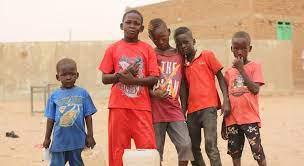
Two senior UN humanitarian officials have called for more funding and less bureaucratic impediments to support civilians affected by the war in Sudan, including roughly 14 million children.
Ted Chaiban of the UN children’s agency, UNICEF, and Edem Wosornu with the UN humanitarian affairs office, OCHA, briefed journalists on their recent mission to the country and Chad, one of several neighbouring nations hosting some 900,000 people who fled the violence.
Fighting between the Sudanese Army and the paramilitary Rapid Support Forces (RSF) recently passed the 100-day mark. Overall, 24 million people across the country require aid.
Dreading another Darfur
Mr. Chaiban, UNICEF’s Deputy Executive Director for Humanitarian Action and Supply Operations, expressed hope that ongoing talks in Saudi Arabia will lead to a cessation of hostilities. He said the conflict is threatening the lives and futures of children and young people, who make up over 70 per cent of Sudan's population.
“I saw the total of the atrocities committed against children and women during the darkest days of the Darfur conflict 18 years ago. Both Edem and I were there. And I think we're deeply concerned that we could be looking at a repetition of these terrible days,” he warned.
In Sudan, children are being killed, injured, abducted, and even recruited into armed groups. They have fallen victim to ethnic- and gender-based violence, while the schools and hospitals they depend on are being damaged, destroyed and looted.
Mr. Chaiban said nearly 14 million children desperately need humanitarian relief – a number that is equivalent to all the boys and girls in Colombia, France, Germany or Thailand. Some 1.7 million have been driven from their homes, adding to the nearly two million who were already uprooted before the crisis.
Impossible choices
“Parents are making the impossible choice of deciding whether to stay or leave, and leave everything behind they have known,” he said. “And those children who are on the move, both within Sudan and neighbouring countries, are vulnerable to hunger, disease, violence and separation from their families.”
Furthermore, three million under-fives in Sudan are malnourished, with 700,000 at risk of severe acute malnutrition and mortality. Some 1.7 million children could miss out on critical vaccinations, raising the risk of disease outbreaks.
“In White Nile State we currently have what is usually a lethal combination, which is acute watery diarrhea, measles and malnutrition in the same place, and that needs to absolutely be contained because otherwise the consequences are severe,” he said.
‘The world needs to wake up’
This week, UN agencies reported that more than 20 million people across Sudan now face severe hunger and six million are on the brink of famine. Nearly four million people alone have fled their homes to seek safety, including across the border into Chad, South Sudan, the Central African Republic, Ethiopia and Egypt.
Of those who remain, scores have been flocking to Port Sudan, the city on the Red Sea where the UN established a hub shortly after the fighting broke out. The arrivals are being hosted by family and friends who can barely meet their own needs as rents skyrocket and civil servants go unpaid, said Ms. Wosornu, Director of OCHA’s Operations and Advocacy Division.
She met with women in Port Sudan and the nearby town of Sinkat, “and their stories keep me awake at night.” These women spoke about seeing their homes “obliterated in one minute”, or difficulties in accessing lifesaving medicine such as insulin.
“We are receiving credible reports of all sorts of horrors and the world needs to wake up and hear this,” she said.
Delivering aid to millions
Ms. Wosornu pointed to “the good news amidst all this gloom”, as the UN and 93 humanitarian partners have been delivering aid wherever they can.
“We have been able to get to hard-to-reach areas,” she said. “We're able to move trucks from Port Sudan to Darfur, and this is through de-confliction, talking to the parties to the conflict, allowing us to move goods as we could.”
OCHA has facilitated the movement of some 780 trucks carrying 35,000 metric tons of relief supplies since fighting broke out in mid-April. “Each of these movements requires extensive painstaking negotiations to ensure that we don't get more deaths of civilians or the 18 aid workers that have been killed so far,” she said.
People just want peace
Between April and June, humanitarians reached at least 2.5 million people. However, their target is 18 million, underscoring the need for greater financial support and fewer bureaucratic impediments. A $2.6 billion appeal for Sudan is just a quarter funded, or $625 million. UNICEF alone urgently needs $400 million to continue operations over the next 100 days.
“Overall, I think the message is that we can't accept the toll that this war is taking on Sudan's children, their families and the future,” said Mr. Chaiban.
He added that their message to the warring parties is also clear: stop fighting and commit to a durable cessation of hostilities, protect civilians, prevent grave violations against children, and ensure humanitarians can safely reach people in need.
“There are talks in Jeddah underway; there are other negotiating processes that we hope and urge can make urgent progress in this regard,” he said.
Ms. Wosornu underlined the need for unhindered and unconditional humanitarian access. “Everyone I spoke to, some people said ‘I don't want food. I don't want water. I just want peace. I want to go home.’ So, this is the message to parties to the conflict as well.”
Source: UN News
https://news.un.org/en/story/2023/08/1139462
 FR
FR EN
EN AR
AR








